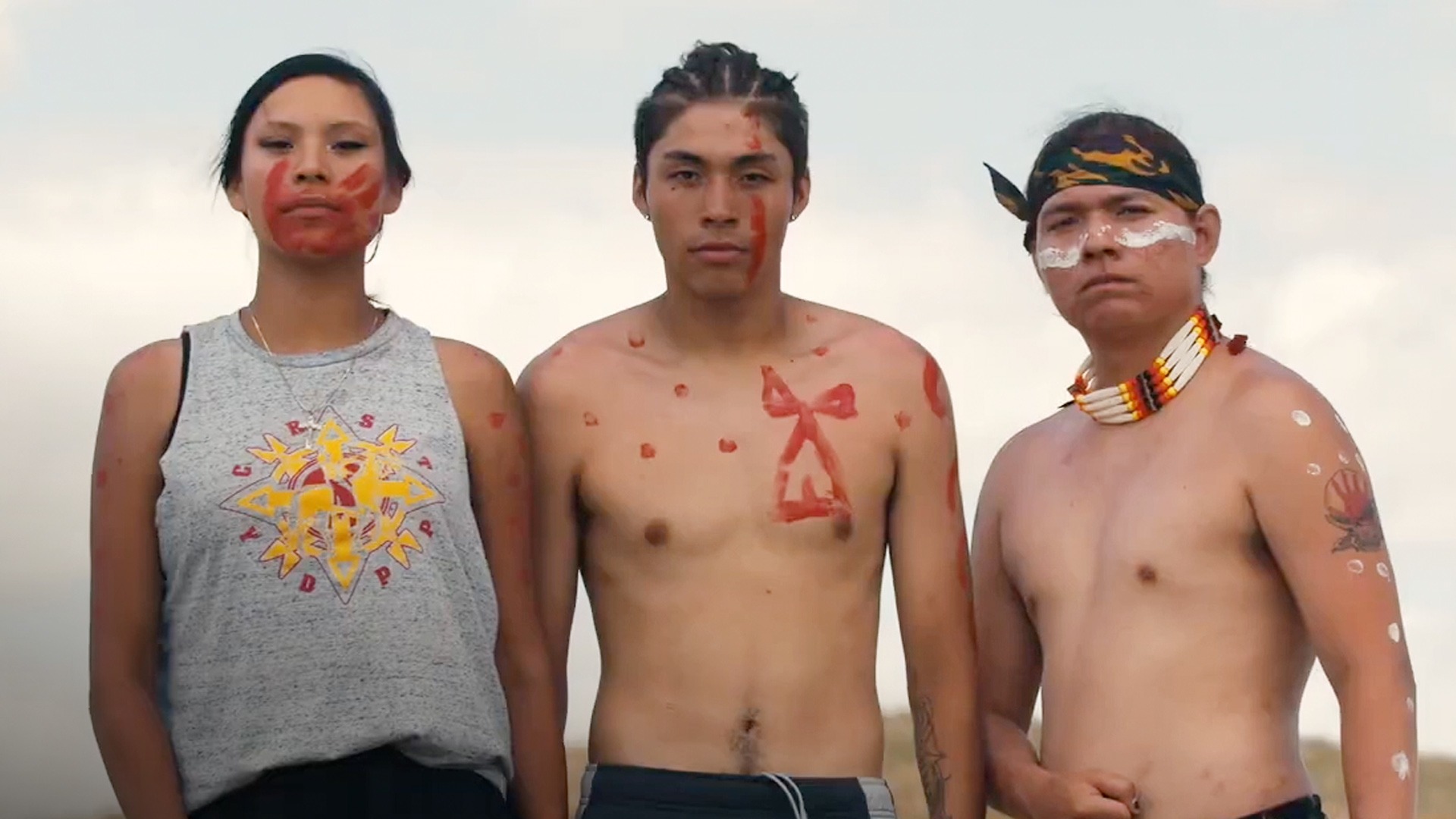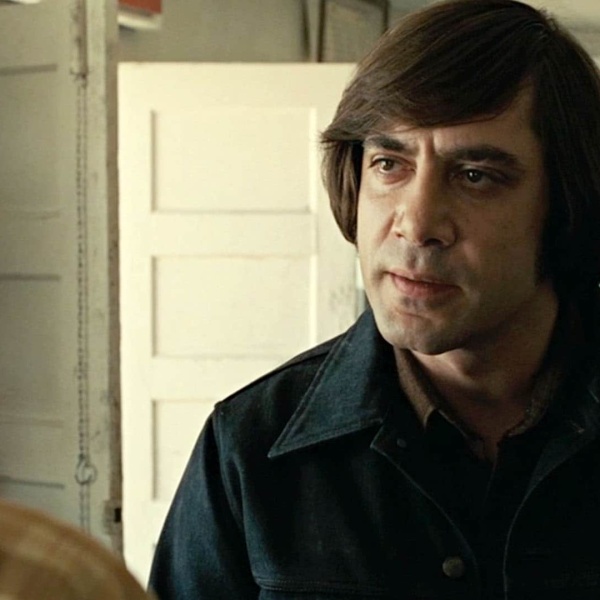A furious yet resiliently hopeful documentary about white America’s long and ongoing history of colonizing the Očeti Šakówin (along with the rest of this land’s indigenous people), Jesse Short Bull and Laura Tomaselli’s vital “Lakota Nation vs. United States” doesn’t waste any of its 121 minutes, but it also boasts a number of moments that effectively squeeze the film’s entire perspective into a single unforgettable image.
Chief among them: The shot of some MAGA jackass at the foot of Mt. Rushmore as they greet anti-Trump protestors at the ex-president’s 2020 Independence Day event while dressed in an American flag t-shirt and holding a sign that simply reads “FUCK YOU.” After all, that succinct little phrase has essentially been the entire platform since America was first christened as such. At this rate, the Republican party will probably adopt it as its official slogan by 2028.
“FUCK YOU” was certainly the prevailing spirit behind the Indian Appropriations Bill of 1876, which “legalized” the U.S. government’s intention to steal the Black Hills from the Oyate who held it sacred, and also the later decision to carve the faces of four dead white guys into the side of a mountain that had long been an ancestral Lakota prayer site known as “Six Grandfathers.” It was the spirit behind the decision to “civilize” indigenous children by sending them to boarding schools that denigrated their culture and endangered their lives, and — before that — the decision to make English the national language of a land that was already fluent in hundreds of others, which turned turned words into weapons of colonization and rendered every one of them into a “fuck you” of its own.
More recently, and most central to Short Bull and Tomaselli’s film, “fuck you” was also the underlying ethos beneath the 1980 verdict of United States v. Sioux Nation of Indians, which ruled that the Black Hills were illegally stolen from their rightful inhabitants, and ordered the federal government to pay $106 million in restitution as the price for taking — and keeping! — the land.
In the right circumstances, even a nine-figure payout can be a “fuck you,” and that one certainly was. With heartbreak in its voice and fire in its eyes, “Lakota Nation vs. United States” lucidly explores the context of that ruling, and unpacks the Lakota’s continuing refusal to put a price on the land that’s owed back to them (with interest, the payout would not be worth approximately two billion dollars).
Of course, the “context” of that ruling is more or less the entire story of the United States, which unsurprisingly proves difficult to fit into the span of a feature-length film. Luminous images of the Black Hills are almost inevitably asked to carry a disproportionate amount of that weight, as the documentary is dominated by interstitial nature footage (shot with requisite awe by cinematographer Kevin Phillips and scaled to the virtuosic peaks and valleys of Raven Chacon’s emotional score).
And yet, “Lakota Nation vs. United States” seldom feels like it’s searching for emotional shortcuts, as Short Bull and Tomaselli compellingly streamline these violent centuries into a single narrative split across three chapters that flattens yesterday, today, and tomorrow into the same ongoing fight. As one of the film’s exceptionally well-chosen talking heads frames it: “Our goal isn’t to go back and live in teepees — I grew up listening to Tupac! It’s about building a future that this next generation can see ourselves in.”
The film relies on two primary methods to viscerally express that atemporal perspective: The first and most effective of those is the searing poetry of Layli Long Soldier, who narrates long stretches of the documentary with readings of her work. Moving in its own right, her personal, heartsick account of the Očeti Šakówin experience offers a pointed contrast to the second method: The extensive use of news footage and movie clips to illustrate how white America mass-produced the fiction that “Indians” are a relic of the past (and justified the methods that supposedly relegated them to it).
Yes, that includes a slew of the usual culprits, with classic Westerns like “The Searchers” making their requisite appearances, alongside decidedly less classic Westerns like Robert Siodmak’s “Custer of the West.” But it also takes aim at some unexpected targets, such as Steven Spielberg’s “Lincoln,” which isn’t dinged as some kind of bad object that we should throw into the ocean, but rather highlighted as a clear example of the lens through which the American story has typically been told.
Spielberg’s film would seem to explore every angle of the work done to enact the Emancipation Proclamation, but Short Bull and Tomaselli argue that it pointedly omits Lincoln’s decision the same week to sign off on the execution of 38 Dakota men for launching an uprising in Minnesota during the Civil War, the largest execution of its kind in American history. The full truth of the matter is a bit more nuanced than this documentary is willing to explore (Lincoln also commuted the sentences of 265 Dakota who were scheduled to die that day), but the details neither excuse the atrocity nor distract from the greater point that even progress can serve as its own kind of erasure.
Ironically, the stirring and optimistic final chapter of “Lakota Nation vs. United States” hinges on the necessary role that allyship has and will continue to play in the ongoing fight to return the Black Hills to its rightful inheritors, as the film (executive produced by Mark Ruffalo, natch) centers on present-day struggles like the opposition to the Dakota Access Pipeline. It’s in the support of non-indigenous Americans — precisely the same kind of support engendered by this film — that Short Bull, Tomaselli, and several of their subjects find reason to hold out hope for the justice that has been denied the Očeti Šakówin for so long.
Such pipelines are simply modern expressions of the same pillaging that was done to this land several hundred years ago. It’s always been the same fight, but it’s a fight that can still be won so long as people can see that it hasn’t been lost yet. “The best days of the Lakota are in front of us, not behind us,” the aforementioned Tupac fan observes at the end of the film. And that’s what makes “Lakota Nation vs. United States” more than just a history lesson; more than just an essential primer for (and parallel to) Martin Scorsese’s forthcoming “Killers of the Flower Moon.” “Fuck you” might be world history’s most dangerous and persistant ideology, but there’s never been much of a future in it.
Grade: B+
IFC Films will release “Lakota Nation vs. United States” in theaters on Friday, July 14.



